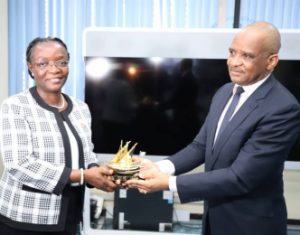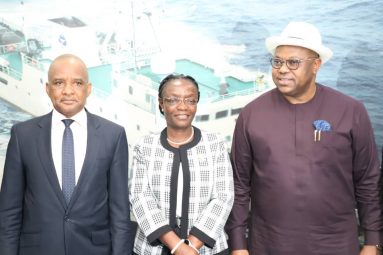The Ghanaian Maritime Authority (GMA) has commenced a 10- Day programme to understudy the implementation of the Coastal and Inland Shipping Act also known as the Cabotage Law in Nigeria under a collaborative arrangement with the Nigerian Maritime Administration and Safety Agency (NIMASA).
The Director General of NIMASA, Dr Bashir Jamoh, while addressing the Ghanaian delegation, expressed delight at the opportunity to share knowledge on Cabotage implementation noting that it will not only enhance regional collaboration, but also have a multiplier effect of increasing local participation in the regional maritime industry.
“As a regulatory and enforcement agency, we are committed to ensuring that our core mandates are accomplished in such a manner that will provoke economic development for Nigeria, while growing indigenous capacity in line with international best practices.
“Since the advent of the Cabotage Act in Nigeria, about 68 percent of vessels trading within the country’s maritime space are now Nigerian-flagged. We have also made progress in the area of placement of Nigerian seafarers on board Cabotage vessels, as well as building vessels from the keel, particularly smaller crafts.” Dr. said.
He also spoke about the Cabotage Vessel Financing Fund (CVFF) introduced to offer financial assistance to operators, stating that the fund is obtained through the collection of a 2% surcharge from the total contract sum performed by any vessel engaged in Cabotage trade.
The NIASA boss expressed optimism that the amended Cabotage Act will be signed into law very soon.
”The Cabotage Act, was signed into law in 2003 after two decades of implementation and reality on ground, it is now clear that the law requires amendment and the Nigerian National Assembly have made tremendous progress towards having the revised Cabotage bill assented to by Mr. President”
On her part, the Director, Legal/ Board Secretary of Ghana Maritime Authority (GMA), Patience Diaba expressed delight at the opportunity to learn from the Nigerian experience in its implementation of the Cabotage law.
Diaba noted that Ghana is privileged to have an opportunity to learn from the experience of Nigeria; stressing that the valuable insights would ensure Ghana avoids the pitfalls and challenges that plagued Nigeria at the initial stage.
Her words: “We appreciate the time and efforts of the NIMASA team who will be sharing their insights and expertise with us over the next few days. We look forward to a fruitful discussion and site visits, especially the visit to Port Harcourt and other activities that have been planned for us.”
“We are confident that our time will be rewarding and we will return to Ghana better informed and equipped to implement the Cabotage regime in our nation. We are excited to begin this 10-day study tour.”
In his welcome address earlier, the Executive Director, Maritime Labour and Cabotage Services, NIMASA, Engr. Victor Ochei observed that Nigeria’s Cabotage achievements did not come without pitfalls and struggles that were surmounted through consistency.
“Our achievements, processes, knowledge acquired and experience are what we will be sharing with you within this short period of time. Luckily, you will be gaining these set of skills without the inclusion of the pitfalls we had to learn from to attain our current level.”

“In the course of this under-study, we intend to chronologically take you on a historical sojourn and enlighten you on our famous “4 Pillars of Cabotage”. We shall put you through the enabling legislations and instruments that empower us to operate as well as our enforcement procedures amongst others,” Ochei said.









Comment here